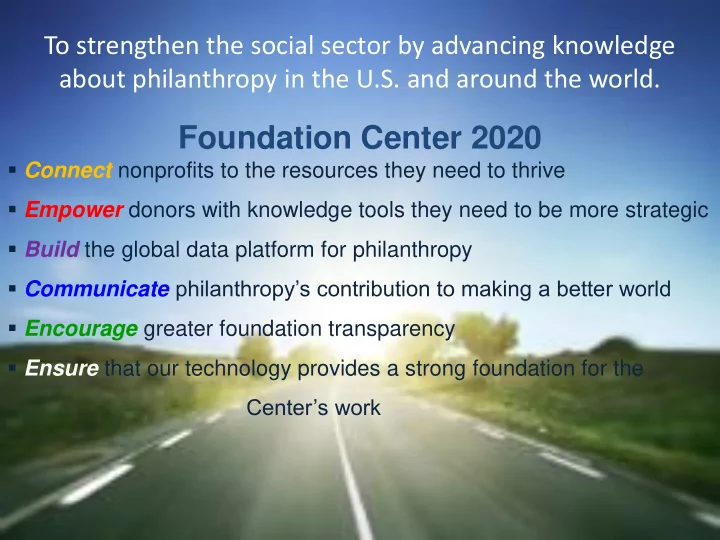

To strengthen the social sector by advancing knowledge about philanthropy in the U.S. and around the world. Foundation Center 2020 Connect nonprofits to the resources they need to thrive Empower donors with knowledge tools they need to be more strategic Build the global data platform for philanthropy Communicate philanthropy’s contribution to making a better world Encourage greater foundation transparency Ensure that our technology provides a strong foundation for the Center’s work
Information + Innovation = Knowledge Data enhanced by our analysis, network, and best-in-class technology Delivering knowledge to those who leverage it to change the world
Information + Innovation = Knowledge
FOUNDATION CENTER DATA CIRCLE IS GLOBAL EUROPE European Foundation Center U.K. Charity Commission DAFNE FC + 485 F.I.N.s in 17 countries WINGS UNDP – SDGs IATI OECD DAC ASIA OECD NetFWD China Foundation Center SDGfunders SOUTH AMERICA Fondos a la Vista AFRICA Asociación de Fundaciones AUSTRALIA SDGfunders Empresariales Coming soon… Philanthropy Nigeria SDGfunders Morocco civil society support Washfunders
FOUNDATION CENTER SERVICES
Technology alone won’t drive insightful, data-driven decisions. Philanthropy will be increasingly data- and knowledge-driven as donors strive for more impact on a larger scale, and finding the right information quickly will be paramount.
What questions do you want to answer? Well structured data and good data practices help inform the questions you want to answer • Relevant data points • Required fields • Organization standards • Retro-code
Excerpts from GrantCraft survey on Transparency
Excerpts from GrantCraft survey on Transparency
QUESTIONS? Anytime Access to Answers Who else is funding a particular issue in our region? What organizations are tackling that issue? Who is working with specific populations in our community? Who may be natural collaborators? Where are there gaps in funding? How much money is collectively going to address specific issues or areas in our region? What are strategies at play?
LET’S TALK – PLEASE ! Recent Foundation Center survey concluded that U.S. foundations have more than 250 ways to describe “general operating support” TAXONOMY serves as the solution for lack of common framework across countries, within foundation networks, between individual foundations and nonprofit organizations and even within their own walls .
Structure of GCS Taxonomy Types of Subject support categories categories 1,100+ 100 Recipient Populations organization served Geo-area served categories categories categories 1,000+ 50+ 100,000+
Philanthropy Classification System THE NEW CODING FRONTIER
REVIEW PARTNERS + feedback from nearly 100 organizations
New Philanthropy Classification System ? ? ? ? ? Data Data ? Data ? ? Data Data ? ? ? ? ? ? Data Data Data Data Addition of TRANSACTION TYPE Subjects /Recipient Addition of Activities aligned STRATEGY Reduce categories from 26 to 18 850 terms ? Removing ? Geo-area served Type of Support Easier to add and autocode Populations served Addition of significant expansion ORGANIZATION TYPE 8 categories 166 terms
REORGANIZING THE TAXONOMY Current Version Updated Version Change Made Science/technology research Renamed Science/technology institutes, services Science & Technology research institutes, services Science Science Physical/earth sciences Physical Sciences Renamed Physical/earth sciences Marine science Oceanography Renamed Marine science Astronomy Astronomy Space/aviation Space/aviation Chemistry Chemistry Physics Physics Geology Geology Environmental Science New Mathematics Mathematics Statistics New Engineering & Technology Technology Split Technology and Engineering Computer science Computer science Robotics New Biotechnology New Nanotechnology New Assistive technology Assistive technology Engineering Split Technology and Engineering Civil engineering New Mechanical engineering New Chemical engineering New Electrical engineering New Biology/life sciences Biology/life sciences Anatomy (human) Human physiology Renamed Anatomy (human) Anatomy (animal) Zoology Renamed Anatomy (animal) Molecular biology New Biochemistry New Botany Botany
POPULATION SERVED UPDATES Category New Term Examples Work status and Researchers occupations Domestic workers Activists Social and economic Cross-border families status Working poor Detainees Family relationships Adolescent parents Foster and adoptive children Caregivers
EVOLUTION OF TYPE OF SUPPORT Type of Support Transaction Support Type Strategy General Capacity Cash P.R.I. Support Building
Raw Data vs. Comprehensive Information • Greater understanding of philanthropy worldwide and opportunities for donor collaboration • Better opportunity for in-depth and comparative analysis • Better ability to identify funding gaps and emerging trends to assess need • Improved platforms and visualization tools • Greater transparency
Creates culture of Current grant info data sharing, shared internally evaluation and and externally maintenance DON’T BE A DATA VOYER - SHARE IF YOU Increase in sharing CONSUME opens more Staff has access to avenues of data data they want and illustrates how about the field data can be used Better data collection and quality encourages it to be used in workflows
Ease of Use
Use Data For Strategy and Knowledge 25
Recommend
More recommend